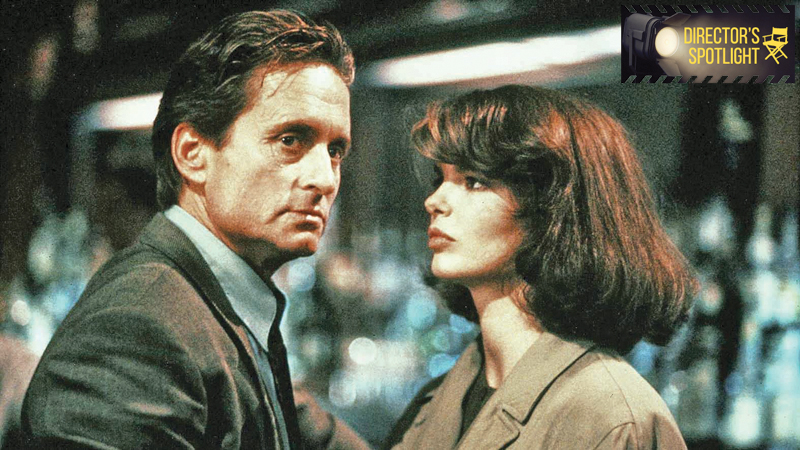In Paul Verhoeven’s films, the blood and the gore come out agonisingly slowly, yet they make up some of the most intense displays of violence I’ve ever seen onscreen. Verhoeven tends to indulge himself in these scenes; violence becomes a crucial part of his stories. In the opening sequence of Basic Instinct, the unnamed woman stabs a man during a bout of sex. When the knife comes swooping down on his face, mutilating him, we feel his pain. His screams become our screams.
This is violence of the most metallic, intellectualised form: we step back and relish it, even though we realise we’re indulging in it. There is an almost guilty pleasure to all this: it’s like the peeping tom from countless Hitchcock films.
Verhoeven’s work falls into two categories. In the first, he explores individuals grappling with their own sexualities. More often than not, they have gone through much trauma: they can’t come to terms with their pasts. Not until the very last scene of Basic Instinct do we realise that the woman we were rooting for was the murderess around whom the story revolved. Yet there is no shock in the revelation: given her past, we understand what she’s doing and why she’s doing it.
Complex situation
In one of his more recent films, Elle, the heroine, played by the great Isabelle Huppert, is raped early on. She spends the rest of the story trying to find her assailant, a complicated enough setup made more complex by her refusal to resort to the police. In his latest work, Benedetta, a lesbian nun finds her affections too hard to ignore, a simple enough conundrum, except that she’s in 17th century Europe.
In the second category, Verhoeven fuses science-fiction with action, mystery, and suspense. Robocop, a landmark for its time, celebrates vigilante violence, but it’s the sound effects and pyrotechnics that really keep that film going. Total Recall, a much better work and one that deserves comparisons with James Cameron’s movies, turns a complex sci-fi short story into one of the most mind blowing genre films to ever come out of Hollywood.
Seeing its remake you realise how much of a landmark the original was for its time: it lacks the dark sweep of the later version, sure, but even at its most lighthearted moments, it reverberates with the kind of life that not even Colin Farrell, with his good boy charm, can bring about. Verhoeven in these movies emerges as the sort of director Roland Emmerich could have become: a sci-fi director who grapples well with complex, intelligent, not-too-difficult themes.
How does one account for the kind of violence in Verhoeven’s world? Partly, if not mainly, this has to do with his childhood. Born in Amsterdam during the Second World War, young Verhoeven and his family moved to The Hague at the peak of that conflict. Seeing through the rigours and traumas of bomb raids and endless skirmishes, he recalls being moved by the violence entailing it all. It was at his school, where his father taught, that he picked up an interest in filmmaking.
Celebrated adaptation
He made his first short film in 1960; seven years earlier he and his family had gone out to watch George Pal’s celebrated adaptation of War of the Worlds, a film that made a heady impression on him. These were indeed formative years: sci-fi was facing a renaissance in Hollywood, while elsewhere in Japan Godzilla was roaming the roads of Tokyo, in its own way cautioning against the dangers of nuclear science.
Verhoeven’s debut short film went down well enough, but he did not disagree with his parents’ decision to enrol him at the University of Leiden. At University he completed his studies in mathematics and physics: though he never made much use of it, it came in handy and gave him free rein over his imagination when he delved into sci-fi. That, of course, was a genre which took time to crop up in his work: in his first few films, he waded into realistic and dramatic territory, the sort epitomised by his more recent work.
His first feature film, in 1971, was followed by a larger success, Turkish Delight, which made the rounds with critics and audiences. Soldier of Orange went international in 1979, and he made his first English language film four years later: Flesh and Blood. It was at that point that he decided to move into sci-fi territory, with Robocop in 1987 and Total Recall in 1990.
Oscillating between two worlds, of psychological drama and blood-and-gore violence, Paul Verhoeven’s films depict characters with dark, hidden pasts behind them. More often than not those pasts catch up with them: in Total Recall, the protagonist’s troubles begin at the moment he literally recalls his background. In his more recent work Verhoeven appears to have gone back to his early days, when he was probing psychology and not really delving into the kind of violence that animates his middle-phase.
Highly acclaimed by critics and making the rounds at several film festivals, both Elle and Benedetta reveal a state of mind deeply fixated on the inner lives of women. In one sense, Verhoeven can be accused of making use of women – of depicting them with all the eroticism they can muster – which is why feminists were outraged at his portrayal of a lesbian relationship in Basic Instinct. Yet in another he is instinctively with and for them. In this he shares much with Brian de Palma, another director accused of activating stereotypes about and against women.




Add new comment